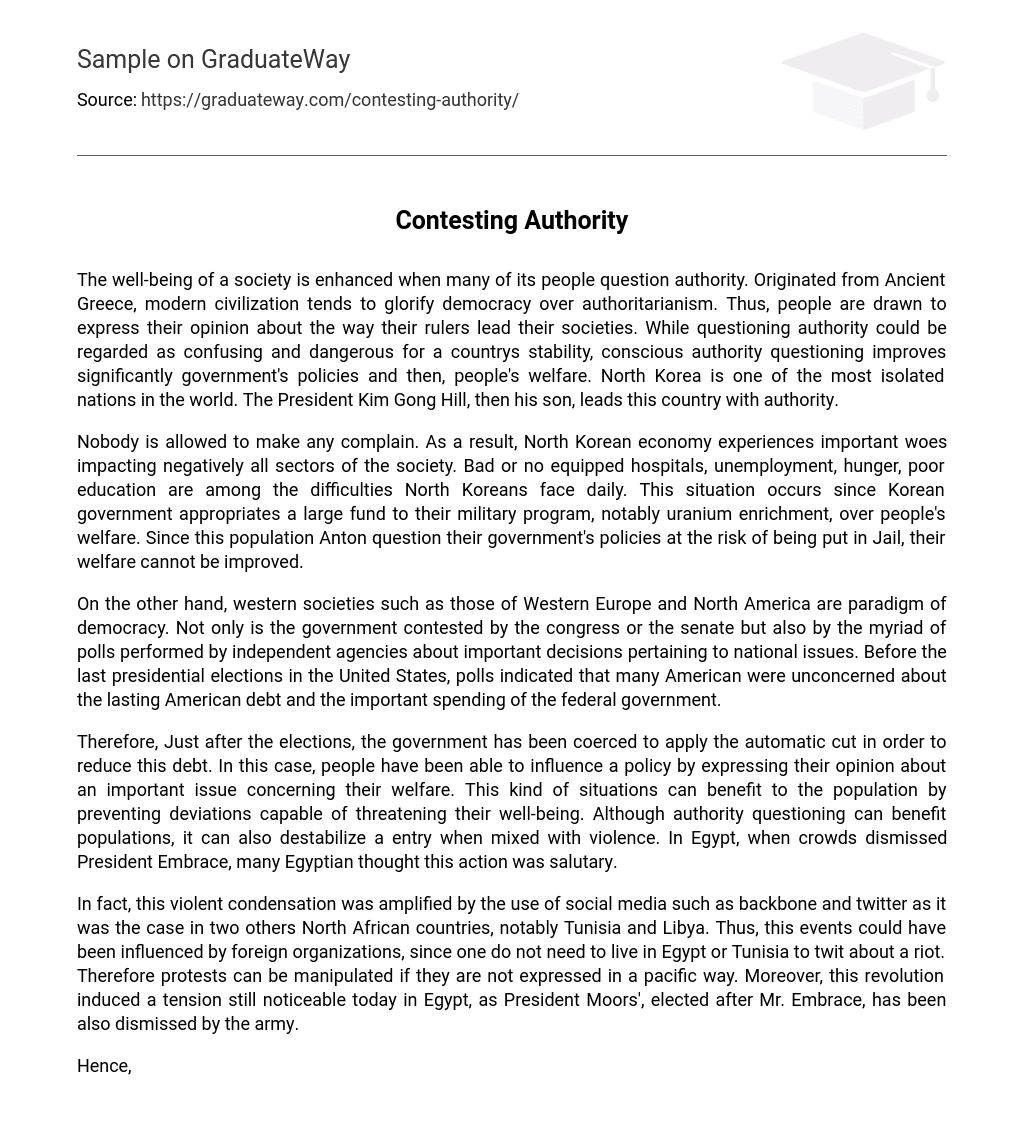The well-being of a society is enhanced when many of its people question authority. Originated from Ancient Greece, modern civilization tends to glorify democracy over authoritarianism. Thus, people are drawn to express their opinion about the way their rulers lead their societies. While questioning authority could be regarded as confusing and dangerous for a countrys stability, conscious authority questioning improves significantly government’s policies and then, people’s welfare. North Korea is one of the most isolated nations in the world. The President Kim Gong Hill, then his son, leads this country with authority.
Nobody is allowed to make any complain. As a result, North Korean economy experiences important woes impacting negatively all sectors of the society. Bad or no equipped hospitals, unemployment, hunger, poor education are among the difficulties North Koreans face daily. This situation occurs since Korean government appropriates a large fund to their military program, notably uranium enrichment, over people’s welfare. Since this population Anton question their government’s policies at the risk of being put in Jail, their welfare cannot be improved.
On the other hand, western societies such as those of Western Europe and North America are paradigm of democracy. Not only is the government contested by the congress or the senate but also by the myriad of polls performed by independent agencies about important decisions pertaining to national issues. Before the last presidential elections in the United States, polls indicated that many American were unconcerned about the lasting American debt and the important spending of the federal government.
Therefore, Just after the elections, the government has been coerced to apply the automatic cut in order to reduce this debt. In this case, people have been able to influence a policy by expressing their opinion about an important issue concerning their welfare. This kind of situations can benefit to the population by preventing deviations capable of threatening their well-being. Although authority questioning can benefit populations, it can also destabilize a entry when mixed with violence. In Egypt, when crowds dismissed President Embrace, many Egyptian thought this action was salutary.
In fact, this violent condensation was amplified by the use of social media such as backbone and twitter as it was the case in two others North African countries, notably Tunisia and Libya. Thus, this events could have been influenced by foreign organizations, since one do not need to live in Egypt or Tunisia to twit about a riot. Therefore protests can be manipulated if they are not expressed in a pacific way. Moreover, this revolution induced a tension still noticeable today in Egypt, as President Moors’, elected after Mr. Embrace, has been also dismissed by the army.
Hence, these excessive complaints, Instead AT Improving Egyptians welfare, worsened Also, frequent and permanent questioning do not automatically improve welfare. In 2008, many western societies countries, regarded as the most democratic countries, faced an idiosyncratic financial crisis which impacted negatively the economy of these countries. Some of them, such as Spain, Greece, and the United States are still trundling to overcome this situation threatening their citizen’s welfare.
In conclusion, people should express their opinion about their rulers’ policies. By preventing authorities from deviation, questioning contributes to improve people’s well-being. Nevertheless such questioning should be expressed pacifically and consciously in order to avoid manipulations often leading to tensions and wars. Ultimately, permanent questioning does not lead necessarily to welfare improvement; other factors such as international financial market could weight in a country’s population’s welfare.





